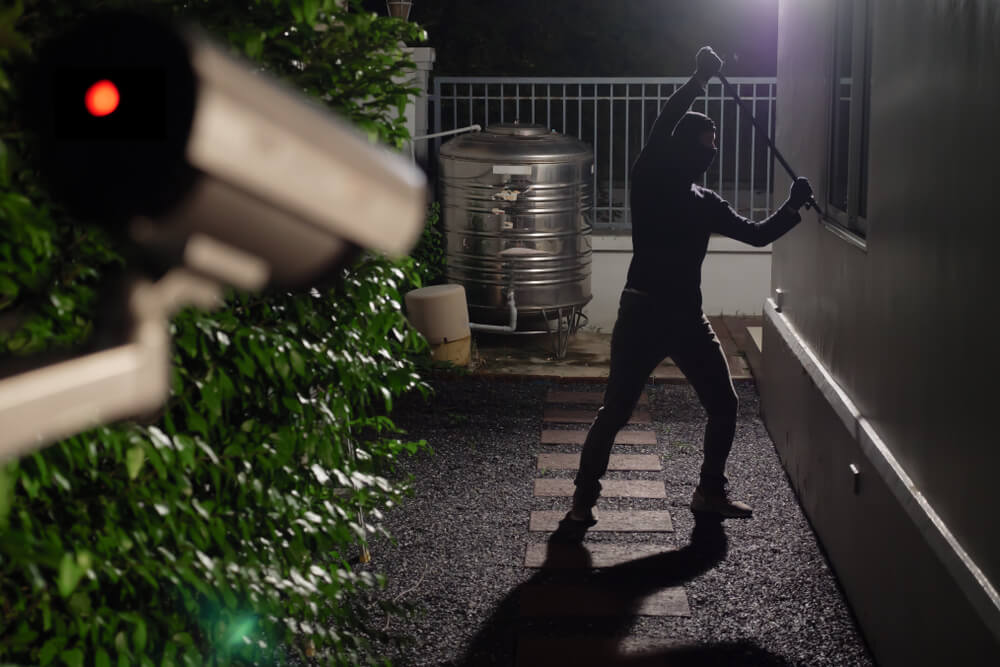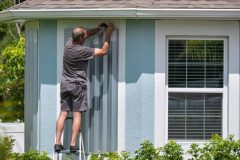Common Home Insurance Claims in Georgia and How to Avoid Them
The most common home insurance claims include weather damage, flooding issues, fires, and burglaries. This guide will help you figure out how to mitigate and ideally prevent these claims so you can save money on your homeowners insurance premiums in the Peach State.
Tackling Weather-Related Damage Proactively
Here in Georgia, hurricane season starts in June, and the “fun” doesn’t end until as late as November. So the question is: How can you handle weather damage proactively? Let’s assume for a moment that you’re sitting high (and dry) in May, just before hurricane season starts rolling in. Here’s a useful checklist to prepare for it:
- Cover your windows with shutters or other types of protection. In a pinch, you could even consider using plywood or other cheap wood products to board up especially vulnerable parts of the exterior of your home.
- Have a first aid kit and “disaster go bag” ready for action, including flashlights, batteries, radios, and blankets. You should also have some water and food, such as canned goods and other non-perishables, just in case.
- On the insurance side, understand the difference between actual cash value and replacement cost coverage, especially if you have lots of valuables.
If the worst-case scenario happens and you do have damage, you’ll want to immediately take photos of what’s happened and also begin the repair process as soon as possible. By having already undertaken a home inventory, you’ll know exactly what you need to replace and what you can fix!
Reducing Risks of Water and Fire Damage in Your Home
There are a few different kinds of flooding that affect us here in the Peach State. The first kind is known as “inland flooding,” and it is actually one of the biggest contributors to weather-related deaths in the USA.
Long periods of heavy rain can lead to aggressive flooding in Georgia, and you don’t have to be on the coastline to experience it. Flash floods are especially dangerous, and they can start fast — sometimes within just hours of a major rain storm or other weather event.
Here’s what you can do to prepare. First, check the elevation of your property. The higher up you are, the less likely you are to experience flooding. If you’re in a flood zone, make sure you have full flood coverage. You can also contact the National Flood Insurance program to see if there are other mitigations to consider.
So that’s water. What about fire? That’s an entirely different set of risks, with its own trade-offs and considerations. The best way to avoid fire damage is to keep your yard (if you have one) in good shape, with plenty of space between your physical home and surrounding vegetation. Install smoke detectors throughout your property and keep a fire extinguisher on hand. Have your furnace inspected regularly, and have an electrician review any concerns to avoid electrical problems.
Fireproofing is another approach — think of it like the second line of defense. And since it sure can get hot down here in the Peach State, you’re going to want to consider installing fire retardants, solid fireproof doors made with non-combustible materials, and even a sprinkler system if possible (though this is typically more likely to be found in apartment buildings and high rises).
And, it goes without saying, don’t forget the golden rule of fire: stop, drop, and roll!

Theft and Burglary Claims and How to Reduce Vulnerability
While southern hospitality is still a thing here in Georgia in the 21st century, theft and burglaries are, unfortunately, still a sad fact of life. But there are some ways to reduce your vulnerability. First, it’s all back to windows and doors (noticing a trend here?). Solid windows and doors with a durable deadbolt are your first line of defense. The second line of defense is motion-sensing lighting on the exterior, as well as a security system if you can afford it. Modern security systems can also allow you to monitor what’s going on from far away via an app.
The best solution, though, is to know your neighbors and form a neighborhood watch team, if possible. This is even easier if you live in an apartment building, but single-family homeowners can also benefit by having strong neighborly connections. Good neighbors look out for each other here in the Peach State, after all. Just remember that homeowners insurance doesn’t cover fallings out at the neighborhood barbecue, alright?
Liability Claims and Ways to Maintain a Safe Environment
A slip and fall on your property is no fun, for sure. Avoiding this can go a long way toward having to file a claim with your insurer and potentially avoid a significant out-of-pocket expense depending on the injury.
Check for things like uneven sidewalks, loose handrails, slippery areas, or overgrown branches, and take care of them before they cause problems. Keep your outdoor spaces clear by removing debris, leaves, or snow, and make sure areas like walkways and driveways are well-lit, especially at night. If you have a pool, secure it with fencing and keep tools or equipment stored safely. Adding warning signs, like “Wet Floor” or “Caution: Ice,” can also help visitors stay aware of potential risks.
Don’t forget to stay on top of structural safety: inspect stairs, decks, and balconies for issues, and keep handrails secure. If you’ve got pets, make sure they’re restrained or supervised, and give people a heads-up with a sign if necessary.
What Georgia Homeowners Need to Know About Exclusions
You want to avoid home insurance claims, but you want to avoid losses that are not covered by your policy even more. Unfortunately, some of these are unavoidable. Standard policies typically exclude these unusual perils:
- Flooding: Standard homeowners insurance does not cover flood damage. Given Georgia’s susceptibility to heavy rains and hurricanes, consider purchasing a separate flood insurance policy through the National Flood Insurance Program (NFIP) or private insurers.
- Earthquakes and Sinkholes: Damage from earth movements, including earthquakes and sinkholes, is generally excluded.
- Sewer Backups: Damage from sewer or drain backups is typically not covered. You can add a water backup endorsement to your policy for this protection.
- Maintenance-Related Issues: Damages resulting from wear and tear are usually excluded.
- High-Value Items: Standard policies have limits on coverage for valuables like jewelry, art, or collectibles. You might need additional endorsements for these items.
- Trampolines and Pools: Injuries related to certain recreational equipment, such as trampolines, may be excluded or have specific conditions.
For these types of risks, a homeowners insurance endorsement can definitely be worth it.
Tips for Regular Home Maintenance to Avoid Insurance Claims
You know that old saying that an ounce of prevention is worth a pound of cure? Basically, the more you do to prevent possible claims, the happier you’ll be. The most important maintenance items for your home include roof maintenance (damaged shingles, leaks, sagging areas, etc.), water damage from plumbing fixtures, HVAC servicing, electrical inspections, and pest control. Keep records of all the major items and make sure you have a record of performing maintenance — this can also come in handy if you ever need to file a claim.
Make Sure Your Home Is Covered with Velox Insurance
With a solid understanding of Georgia common home insurance claims, your policy, and preventative maintenance, you’ll be able to avoid claims and keep you, your family, and your home safe.
For more information about home insurance, give us a call at Velox at (855) 468-3569, get your free quote, or visit us in person at one of our many Georgia offices today!



